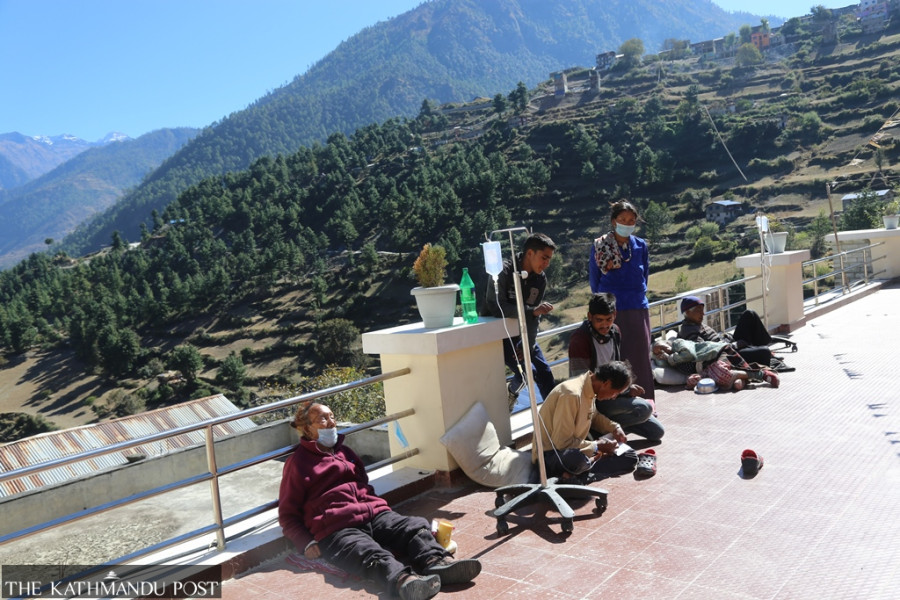Health
Acute shortage of essential medicines at government health centres in Mugu
The district is in dire need of medicines since the number of patients suffering from fever, typhoid, asthma, common cold, diarrhoea and vomiting is on the rise with the onset of winter.
Raj Bahadur Shahi
Satya Devi Shahi, 34, of Soru Rural Municipality in Mugu visited the district hospital two weeks ago with complaints of fever, headache and vomiting. She walked the whole day to reach the hospital and get treated but did not get any medicine that the government provides for free.
“A doctor checked me over and prescribed some medicines. He asked me to purchase them from a private pharmacy stating that the hospital was out of its medicine stock,” said Satya Devi. “I had to spend around Rs 4,000 to buy the medicines since the hospital did not even have essential medicines meant to be distributed free of cost to patients.”
With the onset of winter, the number of patients suffering from fever, typhoid, asthma, common cold, diarrhoea and vomiting in the mountain district is on the rise. But the district hospital that sees around 70 patients on a daily basis does not have essential medicines for patients.
“We ran out of medicine stock two months ago. We examine patients but can’t provide them the medicines,” said Dr Nahakul Shahi at the hospital. “We have been asking the patients to buy medicines from local pharmacies.”
According to him, the hospital is also facing a shortage of rehydration solution, paracetamol injections, Ampicillin, Aciloc, Asthalin, Brufen, Cetirizine and Metrozen among other medicines.
“The medicines purchased in the current fiscal year have all been used up already,” he said. “We are receiving more patients than usual amid dipping temperatures but the patients have to return empty-handed since the hospital does not have essential medicines.”
According to Gyan Singh Budha, chief at the district health office, efforts are underway to bring medicines to the hospital from the regional medical store in Surkhet.
“In the current fiscal year, Rs1.8 million has been allocated for purchasing medicines, but the procurement process was delayed due to frequent change of office chief,” Budha said. Budha himself was transferred to the district health office in Mugu as chief around two months ago.
Not only the district hospital but all 58 health institutions in Mugu, a remote district of Karnali Province, are facing shortage of essential medicines. Health workers across the district say patients have stopped visiting health posts and primary health centres as these centres have not been providing free medicines.
“When we go to government-run health posts, the health workers tell us they don’t have medicines,” said Dil Bahadur Budha of Sorukot Rural Municipality. “Because of that, we are compelled to visit private clinics at Sorukot and Balukuna.”
There are a total of 16 health posts in Sorukot Rural Municipality and all of them have been facing a shortage of medicines for the past few months.
The Ministry of Health and Population provides more than 70 different types of medicines for communicable and non-communicable diseases to district hospitals that have at least 25 beds. Patients are entitled to receive more than 60 essential medicines at primary health centres and 35 types of medicines at health posts free of cost.
Similarly, health posts, primary health centres and government hospitals in Dailekh, comparatively an accessible district from the provincial headquarters in Karnali, are also running without essential medicines.
Tolijaisi Health Post in Thatikandh Rural Municipality of Dailekh ran out of essential medicines three months ago. The villagers have no alternative but to visit private clinics and purchase medicines at local pharmacies.
“We don’t even have medicines like cetamol, metronidazole and rehydration solution at the health post. We have to send patients to private pharmacies to buy medicines. Most patients have stopped visiting the health post, which could be dangerous because they might fall back on home remedies to treat the illnesses or worse, leave them untreated,” said Basanta Prasad Sanjyal, in charge of the health post.
Other health institutions in Dailekh are facing similar ordeals. The District Health Office admits that most health institutions in Dailekh are reeling under medicines shortage.
“The provincial government has allocated just Rs1.5 million for the purchase of medicines in the current fiscal year. How can we supply medicines to 103 health institutions in the district with that amount? Even the district hospital does not have enough medicines,” said Thir Prasad Regmi, chief at the District Health Office.
(Jyotee Katuwal contributed reporting from Dailekh.)




 9.17°C Kathmandu
9.17°C Kathmandu.jpg)















